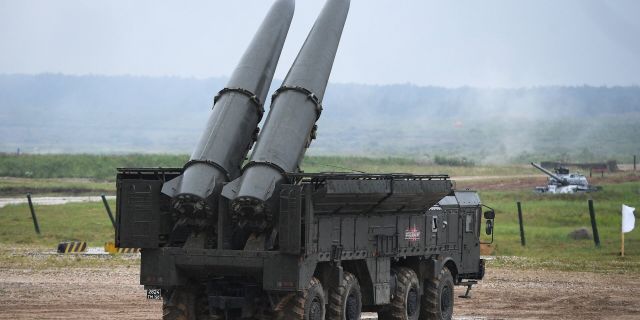Will Russia cover Belarus with its nuclear umbrella?Russia is ready to provide Belarus with missile systems capable of carrying a nuclear warhead, TNI reports.
Thus, the author of the article notes, Moscow sends a signal that it, like NATO, can cover the allies with its nuclear forces.
Debalina GhoshalThe Russian-Ukrainian armed conflict has lowered the nuclear threshold, and Moscow continues to make threats about the possible use of nuclear weapons during hostilities.
In June, this threshold could fall even lower, as Russia promised the former Soviet republic, and now its ally Belarus, that it would soon supply it with Iskander missile systems capable of carrying a nuclear charge.
This could destabilize the situation, since Iskander refers to operational and tactical nuclear weapons. In addition, Russia offered to help Belarus modernize its fleet of Su-25 attack aircraft so that they could carry nuclear weapons on board. Is Moscow really ready to provide Minsk with nuclear security guarantees and jeopardize strategic stability?
When news of the proposal to supply Iskanders went on the air, Kremlin spokesman Dmitry Peskov explained that the systems that Russia intends to transfer to Belarus can carry nuclear charges, but it is far from a fact that they will receive them. This is nothing new, since China, for example, sold nuclear-capable missile systems such as the DF-21 to Saudi Arabia, having previously modified them so that they could only carry a conventional warhead.
There are no reports yet on whether Russia intends to modify its Iskanders before delivery to Belarus. But statements about the possible deployment of systems in nuclear equipment that are not subordinate to the Russian military command are greatly exaggerated. In addition, the systems planned for transfer to Minsk and capable of carrying a nuclear charge pose a non-nuclear threat to NATO to a greater extent, since Belarus does not possess nuclear warheads to equip them.
There is no doubt that Belarus provided Russia with the most important logistical support during the Ukrainian crisis. In February, when only a few weeks remained before the start of the special operation, Russia and Belarus held joint exercises on the Belarusian-Ukrainian border. During these maneuvers, Russia put the S-400 anti-aircraft missile systems on alert. Since then, these launchers have been in Belarus to strike at Ukraine. In May 2022, Minsk announced that it plans to purchase Iskander and S-400 complexes from Russia in order to keep Ukraine from retaliatory strikes on its territory.
Announcing the purchase of S-400s and Iskanders, Belarusian President Alexander Lukashenko accused the West of "elevating Nazism to the rank of state ideology." It was a response to the sanctions imposed by the West against Russia and Belarus for their participation in the military operation against Ukraine. The West has supplied modern artillery systems to Ukraine for conducting defensive actions. Six Russian aircraft launched 12 missiles from the territory of Belarus at the Kiev, Chernihiv and Sumy regions.
It is obvious that Belarus will want to get solid offensive and defensive capabilities to support Moscow during the conflict. Lukashenko has already asked Putin so that these systems can give a "symmetrical response." But so far the West has not dared any nuclear collision with Russia, so the symmetry here can only be of a non-nuclear nature.
In February, Russian President Vladimir Putin issued a threat that if the West intervened in a "special military operation" conducted by Russia, the consequences would be "such as you have never seen in your entire history." Accordingly, Russia has put its nuclear forces on high alert.
Since Belarus supports Russia in its military operation in Ukraine and allows Russian troops to launch offensive strikes from its territory, there is a possibility of retaliatory Ukrainian strikes. But Belarus itself does not take direct part in the fighting and does not send its troops to Ukraine to fight alongside the Russians. Minsk will not want to jeopardize strategic stability by allowing the deployment of nuclear weapons on its territory.
In February, Lukashenko rejected the possibility of deploying nuclear weapons in his country, saying: "If the people of Belarus are not strangled, not only nuclear weapons, but also conventional weapons are out of the question." However, in 2016, he wanted to purchase Iskander missiles in order to modernize the Belarusian ground-based missile units in conventional equipment and equip them with a reliable and inaccessible system for enemy weapons.
And finally, Belarus is considered an authoritarian state, and Russia will not want to risk supplying nuclear systems to a country in which the Kremlin's ability to manage and make decisions is severely limited. Minsk and Moscow are aware of the difficulties of managing nuclear weapons in the event of its deployment on Belarusian territory.
Russia is ready to provide Belarus with missile systems capable of carrying a nuclear warhead. Thus, Moscow sends a signal that it, like NATO, can cover the allies with its nuclear forces by deploying its nuclear umbrella over them. And in this case, Belarus will receive long-range systems and will be able to more reliably and confidently restrain neighboring NATO countries. Thus, this is a situation of mutual benefit for Moscow and Minsk.

